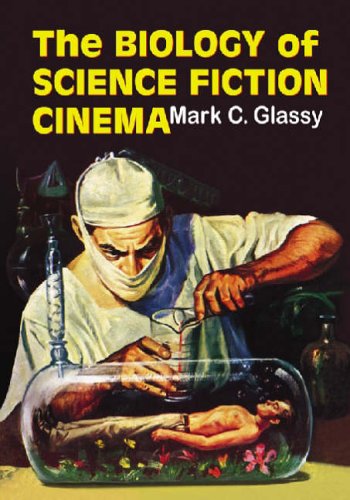The affects of biology on the film industry is probably the topic that interests me the most, however it is extremely difficult to find articles that are relevent to it.
Public understanding of science based on movies:
"While popular culture is generally acknowledged to have some impact on public opinion of science, attempts to evaluate this relationship have focused largely on how the public perceives science, rather than how well they understand it". This teacher uses biology based movies for discussing the more interesting aspects of science such as cloning, artificial intelligence, and recombining animals.
Rose, Christopher. "How to Teach Biology Using the Movie Science of Cloning People, Resurrecting the Dead, and Combining Flies and Humans." Public Understanding of Science. 12.3 (2003): 289-296. Web. 27 Oct. 2013.
Effects of eugenics on the fiction film industry:
It goes through the different eras over the last 100 years and describes how the history of eugenics has affected a specific genre of movies (as film is a type of storytelling).
Kirby, David A. "The Devil in Our DNA: A Brief History of Eugenics in Science Fiction Films." Literature and Medicine. 26.1 (2007): 83-108. Web. 4 Oct. 2013.
Impact of films on student’s interest in science:
This article I found discuses how research was conducted in classes in a university. The students had to watch science fiction films in nonmajor related courses and they had to write a response discussing how realistic the films were to science. At the end of the course, a survey was taken to see how much interest the students had in science after the course.
Laprise, Shari, and Chuck Winrich. "The Impact of Science Fiction Films on Student Interest in Science."Journal of College Science Teaching. 40.2 (2010): 45-49. Web. 27 Oct. 2013.

Written Literature and Ancient Medicine:
This topic isn't quite as interesting as the previous one, but I still find it intriguing. There are several angles I could take with this research and it is intriguing to study ancient civilizations through their literature in regards to medicine.
Indians perception of wind in the body:
Early Sanskrit literature about the ancient five bodily winds. It goes on to determine the similarities to wind in the atmosphere and wind in the body. It focuses on the ancient Indian's views of bodily wind.
Zysk, Kenneth G. "The Bodily Winds in Ancient India Revisited." Royal Anthropological Institute of Great Britain and Ireland. 13. (2007): 105-115. Web. 27 Oct. 2013.
Using documents of ancient civilizations to understand disease and health:
The lectures share a concern for books, reading, and the life of the mind in the premodern age. It discusses treatments in early Western methods. Not my favorite source...
Stock, Brian. "New Literary History." Johns Hopkins University Press. 37.3 (2006): 489-501. Web. 27 Oct. 2013.
Ancient Greek literature affecting perceptions of female gynecology:
This article goes in depth about how the literature of ancient Greece allows a glimpse into the several problems/experiences of women with gynecological medicine and mythical constructions.
Bachvarova, Mary R. "Io and the Gorgon: Ancient Greek Medical and Mythical Constructions of the Interaction Between Women’s Experiences of Sex and Birth." Project Muse. 46.3 (2013): n. page. Web. 27 Oct. 2013.
Treatment for diseases- Islamic Dr in the Middle Ages:
It is about some papers written during the Middle Ages by an Islamic man about treating sicknesses of the poor. It was of a genre that was popular during this time period called "medicine for the poor".
Bos, Gerrit. "Ibn Al-Jazzār on Medicine for the Poor and Destitute." Journal of the American Oriental Society. 118.3 (1998): 365-375. Web. 5 Oct. 2013.

I felt the same way, finding scholarly articles trying to relate biology and film is hard. I had to search 5 different times to find one that was relevant. Try and be as specific as possible, and helping narrow it down by using the advanced search.
ReplyDeleteJillian! I found the article "The Impact of Science Fiction Films on Student Interest in Science." really interesting! The results of the research project were favorable to students being more interested in science, however, seeing as the test subjects were undergrads,I wonder if they were to use a younger age bracket would they get even better results? You have some really good research so far though!
ReplyDeleteThe article about wind and the body seems interesting. I served my mission in Argentina and many people there believe that air gets in your from wind or leaving a bus window open and it makes you sick or sore. They have sticks that look like chalk (I think I was told they are made of sulfur) that they roll on the area that has air and that is supposed to fix it.
ReplyDelete